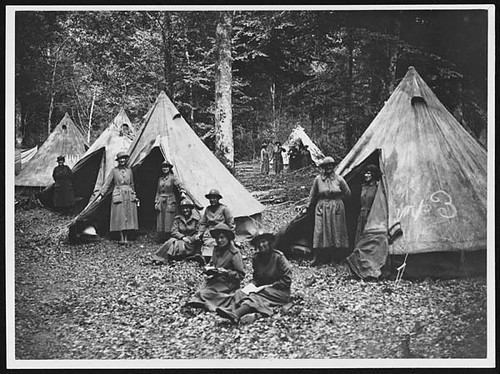
A rare archival photo of Allana at her summer job?
I spend my summers doing manual labour, living in a tent. It's not glamorous, but it is good for the skin. (Until I get cancer.) Since I've been back, I've lived in a house on a dirt road, kilometres from the nearest convenience store. I don't have internet access at home. Thus, a six-month delay in both finishing book and blog and removing the word "failure" from my self-description.
I will, however, let you in on a choice upside to my current hermitage in the wilderness: my house contains a respectable library to which I have unfettered access. (I fancy myself a bit of a caretaker, actually.) What this means for you, dear reader, is that whenever I look something up in the Oxford Universal, the Chambers Biographical, or Bartlett's Familiar Quotations (so good), you now have the assurance that I haven't just copy-pasted some quasi-reliable Wiki, or even done a lackadaisical search on the Difference Dictionary. I'm doing it the old-fashioned way for the first time in my short, technology-addled life. And it's embarrassing to note how weak my short-term memory can be, and how desperately I wish these books were illustrated.
For example, the Leyden-jar mentioned on page 245, according to the OUD, is an electrical apparatus conducting charge from a tinfoil-coated glass bulb via a brass rod running through its corked lid. It uses the phrase "communicating with the internal armature." Now you know. (Sort of.)
Then I asked the CBD about a "Ballester-Molina" handgun, only to find a golfer and a Jesuit, which, though unhelpful, led me on a fascinating referential journey on the concept of original sin. (From 1449: "The sect of Pelagianys, which helden that a man bi his fre wil mai deserue heuen withoute grace.")
A phalanstery, circa 1850, refers to the Rousseauian and Fourierist (that's Charles, the social theorist, not Jean Baptiste, the mathematician that hung out with Napoleon) conception of small, socially integrated communities, self-sustaining and familiar. Rooted from "phalanx." Related to Panty-suckers. Err, Pantisocrats, who simply think all men are equal.
(And did you know that there is a Samuel Coleridge-Taylor, not just a Samuel Taylor Coleridge? The former being the composer of Hiawatha, I feel it would be especially unfortunate to confuse the two.)
Terminology Rock, or, A concise apology to the Internet.
Written by Allana on Monday, October 25, 2010
Subscribe to:
Post Comments (Atom)




I am in utter envy of your contemplative time. I'll have my own informative apologetic note up tomorrow, and then we'll begin tackling the latter half of the book.
ReplyDeleteNice to read you again!
BEST. PICTURE. EVER.
ReplyDelete